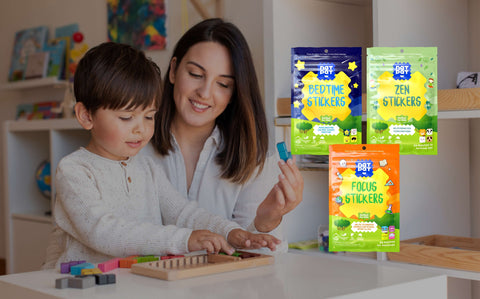Worrying about a child’s attention span can preoccupy many a parent's minds. With everything going on, and all the outlets for so much stimulation, this happens a lot. It’s easy to see why anyone would worry they aren’t able to focus for as long as they should. But what are the normal attention spans for every age group?
Well, we’ve got them all right here, and we are laying down the info. At The Natural Patch Co., we want to help every parent out there feel more comfortable and confident when raising their families.
Let's discuss your child's needs, possible attention problems, and how modern technology can help (or hurt).
What Exactly Is Attention Span?
Basically, your attention span is the length of time you can concentrate on a project or area of interest before losing your focus and interest in it when confronted with fatigue or other stimuli.
There is significant variability between every individual, but the general estimates and ranges per age group are set due to the expectations of those age groups.
They’re vital to at least know so you can assess if there are difficulties for your child’s age group. Then, you can determine whether or not it’s a small gap or if there could potentially be underlying issues at hand.
If you've asked your little one to focus on their chores or math homework, only to be met with impulsivity, inattention, and interruption (hello, social media and smartphones), you've probably been a little frustrated yourself.
What Do Experts Say About Attention Spans?
Expert opinions on attention span vary slightly depending on the study you use, but in general, children's attention spans should be between two to three minutes per age.
So if your child is five years old, it means that any given task or new activity should hold their attention for bursts of ten to 15 minutes.
Five Minute Rule
The five-minute variance is a general rule of thumb for the typical child. Just like some children walk and talk faster than others, this allows teachers, parents, and counselors a curve to provide for age groups. If your child falls on the lower end of the curve versus the top, it’s not a big deal.
They are still hitting their age milestones and could end up with better attention spans in the future compared to others that are ahead of the curve right now. This means that even if the child struggles a little but falls within the accepted range, they are still learning and thriving. They might just lose interest a little faster than others.
Adulthood and Focus
For adults, the average attention span varies a lot more. As we get older, our attention span will start to revert back to smaller amounts. However, significant differences can exist even within a designated small group.
The peak attention span for adults is in early adulthood (usually our 20s). This is a time when our energy levels are still naturally higher, we tend to have fewer responsibilities, so our attention span has more endurance.
This will slowly start to lessen the older we get, but experts agree that the activities we enjoy naturally maintain a longer period of focus regardless of age. When we have to do the harder things, like work or homework, these tend to hold our attention for shorter time periods. The subject matter absolutely matters.
Consider this: how many of us can say they can sit through their favorite movie for the tenth time but still have a hard time getting through work meetings without a snack? Yep. We’re all in this together.
How Can We Learn To Focus Better?
For kids, this can be a slippery slope; you want to let kids be kids and catch up at their own pace, but you don’t want to pressure them. If your child isn’t able to hold their attention, there may be underlying complications that need to be addressed.
Speaking with a child psychologist can help determine if there are additional obstacles or if your child just needs a more helpful hand. An improved attention span can truly help older children as they transition into teenagers studying for hours.
If a counselor determines that your child isn’t engaging as much as they could, but there isn’t anything holding them back developmentally, then you can start helping them boost their attention span powers.
That’s why we created the FocusPatch. It's a sticker that goes on clothes and helps everyone better focus their attention on the tasks at hand. We can all use a little help now and then, after all.
These patches are made from 100% all-natural essential oils. You can rest assured knowing that your little one (or yourself!) can increase your attention span without the anxiety-inducing expectations (or chemicals).
In addition to wearing our FocusPatch, with a touch of constant guidance, everyone can learn to focus a little better.
Read on and learn more.
Homework Helpers
While there might not be anything serious holding them back, there is still a chance your children are disengaging from activities faster due to a lack of comprehension.
If your kid is struggling through schoolwork and wants to do something more fun like finger paint, they might not understand their work enough to finish. This means they’re going to need your help to pay attention and complete the assignments.
Asking them questions about their homework helps. If you begin with, “What is the assignment asking” or “What is the work about?” they can start to dig deeper into the assignment to understand what is asked of them. From there, they’ll be able to push themselves and their brain to work through the problems and finish their homework.
Burnout Prevention
We firmly believe our children are capable of anything, but hard work takes a toll on developing minds. Just like we need time to meditate or relax throughout the day, our kids need this too.
Taking small breaks for walks or quiet time between homework and other strenuous activities gives our brains well-deserved breaks after hard work is finished. Going outside together for some fresh air and a quick tree climb will give you and your littles some bonding time. This will give your brain some time to cool down and be ready for the next challenge of the day.
Decrease External Red Flags
It really shouldn’t need to be said, but getting rid of distractions around our workspaces is also a critical part of increasing attention spans. For example, if our phones or tablets are within reach while we are working on boring or mundane tasks, we are twice as likely to pick them up for a quick break in assignments.
But those breaks, we both know, last a lot longer than the agreed-upon quick second, and we end up surfing the internet more than anything else. Keeping phones and other handheld devices out of our workstations will help keep the temptation to a minimum. Then, your work will be done faster and with less struggle than before.
Stress Makes a Mess
Another big roadblock for a lot of us is stress. As parents, we never want to think our littles are worrying about things to the point of carrying around stress, but this still may occur.
It was a long time ago, but remember how hard it was to learn all the things we had to learn in school? Add to that now all the outside distractions and expectations, and it’s a shock that our kids get through the day.
Stress can work its way into our minds and set up shop; our attention span decreases greatly when this happens. It means that we are so distracted by the things worrying our kids and us that we forget what we are doing. When you least expect it, our stressors creep back up to the surface.
Living a more stress-free life is challenging but so important to help us get our attention spans back on track. For kids, it’s essential to engage with them and provide them with the time they need to let out their worries.
Emotional Check-In
By checking in with our kids regularly, they’ll have an outlet to clear out their stressors and daily activities. You’ll be able to gauge how they’re doing, both in school and emotionally.
You’ll see after a few weeks of regular check-ins that they’ll be excited about your daily talks, and they’ll slowly have more and more to talk about. As an adult or parent, it might not solve your problems, but this will help ease some of your worries as well.
We aren’t saying talk out your troubles with your kids. But as parents, if there’s anything we know for sure, it’s that when our children are happy and thriving, we are definitely more level-headed. Then, we are able to take on the rest of our obstacles.
Validate Feelings and Evaluate Options
The bottom line: stress will not only eat away at your mental space and attention span, but it is really unhealthy to carry around what feels like the weight of the world every day. If you need an extra boost to your inner clarity, try our ZenPatch.
The delicious blend of Orange, Cedarwood, and Lavender essential oils will have your nose doing a happy dance all day. You will be so calm and centered it will be near impossible for anything to stress you out.
It’s a Journey, Not a Destination
The biggest thing to remember about attention span is that it is constantly changing and evolving. Just like our kids are having to learn how to regulate their attention, focus, and overall headspace, we should also be constantly working on our brains.
If we forget to work on our minds, our minds will start to give up on us. Focusing on tasks will become harder every day at any time of day. So lead by example for your kiddos and learn to put your minds first!
Sources:
What Is Considered a Normal Attention Span? | The Health Board
Short Attention Span: Signs, Causes & Ways to Pay Attention Better | Healthline


